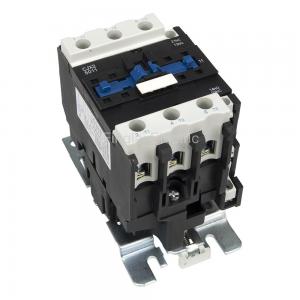

Add to Cart
Function
The function of an AC contactor is to control the flow of electrical current to an electrical load. When a control signal is received, the AC contactor closes its contacts, allowing electrical current to pass through to the load. When the control signal is removed, the AC contactor opens its contacts, interrupting the flow of electrical current to the load. AC contactors are commonly used in HVAC systems, electric motors, and other industrial applications.
Application
Modular contactors are essential for control and automation duties
in dwellings offices shops and hospitals. They are particularly
suitable for switchinglighting installations, heat pumps, night
storage heating, airconditioned plant and for other devices in
building automation.
Technical data
| Standardcontrol voltage(Ue): | 20-230V/50-60Hz |
| Ambient temperature: | -25~+55 |
| Thermal continuous current(lth): | 24A, 40A, 63A |
| Connection capacity: | tunnel terminal for cables up to 25mm |
| Current ratings for AC1: | 24A, 40A, 63A |
| Pole number: | 4 (either as main or auxiliary contacts) |
| Width in 17.5mm modules: | 24A 35mm (2modules), 40A 52.5mm (3modules), 63A2.5mm (3modules) |
| Back up fuse g1maxratings | 35A, 63A, 80A |
| Mechanicalendurance | 10 million cycles |
| Electricalendurance | 1 million cycles |
Difference between contactor and relay
Contactors and relays are electrically operated switches used for the control and switching of loads. The difference between them primarily lies in the load current that they can handle, where they are used, and how they are used in a circuit. This article can give you a clear picture of the difference between contactor and relay.
Constructional Features:
Contactors and relays have similar construction. Both have an
external envelope to protect all the internal parts from the
external environment. An electromagnetic coil is provided for the
opening and closing of contacts. The contacts are opened and closed
by exciting this electromagnetic coil.
Operation of Relays and Contactors:
A Contactor is used for switching motors, capacitors, lights, etc, that
drains very high current. It has at least a single pair of
three-phase input and output contacts. It would be normally open.
Some contactors come with additional auxiliary contacts that may be
either NO or NC. These auxiliary contacts get activated along with
the main contacts. Switching is achieved by energization and
De-energization of the contactor coils. They are chosen based on
the current ratings of the load. Contactors require an additional
supply (either AC or DC depending upon the type of contactor we
use) for excitation.
A relay consists of at least two contacts and an excitation coil. These contacts may be normally open or normally closed. These contacts are closed or opened by exciting the coil. Relays are used for switching control circuits and cannot be used for power switching with relatively higher ampacity. It can be used for switching small lights, sirens, indication lamps, etc.
The key difference between contactor and relay
Relays are switching devices used to control a circuits, a low
power devices or multiplying the number of contacts available.
Contactors are switching devices used to switch on/off heavy electrical loads such as electric motors, power factor correction capacitors, lights, reactors, etc.
